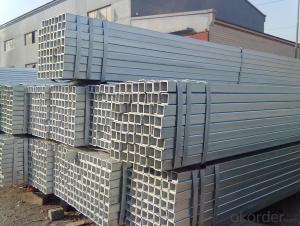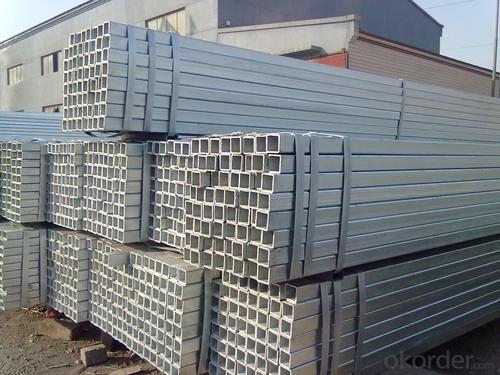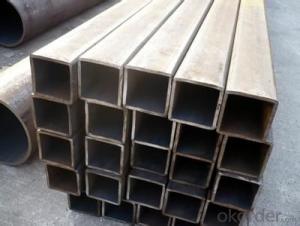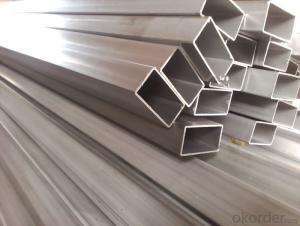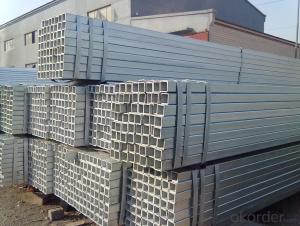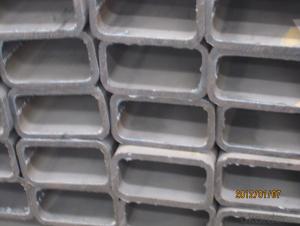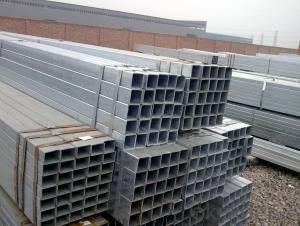Galvanized Rectangular hollow section 20#
- Loading Port:
- Tianjin
- Payment Terms:
- TT OR LC
- Min Order Qty:
- 10 m.t.
- Supply Capability:
- 5000 m.t./month
OKorder Service Pledge
OKorder Financial Service
You Might Also Like
Product Name | rectangular hollow section/ RHS | |
Size | Size: | 10*10--500*500mm |
Thickness: | 0.45--16mm | |
Length: | 3-12m | |
Steel Grade | Q195,Q215,Q235,Q345,16Mn, 20# | |
Standard | ASTM A500,EN10219,GB/T6728,GB/T6725,JIS G3466 | |
Usage | 1. For Structure, Airport, Railway 2. Construction and so on. | |
Ends | Plain end or By Your Choice | |
Surface | Bared Or With Oiled Or Galvanized | |
Technique | ERW ,Hot Rolled and Cold Rolled | |
Section Shape | Rectangular | |
Inspection | With Hydraulic Testing, Eddy Current , Infrared Test | |
Package | Bags, Bundle, In Bulk, Containers | |
MOQ | 20 Metric Ton / Can Be Negotiated | |
Supply Ability | 15,000 Metric Ton/Month | |
Date of Delivery | 7 days(Qty within 1000 Metric Ton) or According To The Quantity | |
Port of Shipment | Tianjin, China | |
Payment | L/C T/T | |
- Q: What is the difference between steel pipes and PVC-U pipes?
- Steel pipes are made of a durable and strong material, while PVC-U pipes are made of a plastic material. Steel pipes are typically used for high-pressure and heavy-duty applications, as they can withstand harsh conditions and have a longer lifespan. PVC-U pipes, on the other hand, are lighter in weight, easier to handle, and resistant to corrosion and chemicals. They are commonly used for low-pressure applications and are more cost-effective.
- Q: Who knows what is the difference between double submerged arc welded pipe and longitudinal submerged arc welding?
- Double submerged arc welding is also a kind of longitudinal submerged arc welding.
- Q: How much is 4 inches steel tube MM?
- The nominal diameter of the 4 inch steel pipe is DN100, that is to say, the diameter of the center of the pipe wall is 100mm.
- Q: What are the different types of steel pipe coatings for nuclear power plants?
- There are several types of steel pipe coatings used in nuclear power plants, including epoxy coatings, fusion-bonded epoxy (FBE) coatings, and polyethylene (PE) coatings. These coatings provide corrosion and chemical resistance to the steel pipes, ensuring their longevity and safety in the demanding environment of a nuclear power plant.
- Q: How are steel pipes connected together?
- Steel pipes are typically connected together using various methods such as welding, threading, or using mechanical fittings, depending on the specific application and requirements.
- Q: Can steel pipes be used for oil refinery applications?
- Yes, steel pipes can be used for oil refinery applications. Steel pipes offer many advantages for oil refinery applications including high strength, durability, and resistance to corrosion. They are able to withstand high pressure and temperature conditions that are common in oil refinery operations. Steel pipes are also easy to transport and install, making them a popular choice for oil refinery projects. Additionally, steel pipes can be customized to meet specific requirements such as size, thickness, and coating, making them suitable for a wide range of oil refinery applications.
- Q: What is the role of steel pipes in the aerospace industry?
- Steel pipes play a crucial role in the aerospace industry as they are used in various applications such as aircraft manufacturing, engine components, and fuel systems. These pipes are known for their high strength, durability, and resistance to extreme temperatures and pressure. They provide a reliable conduit for fluids, gases, and hydraulic systems, ensuring efficient operations and safety in aircraft. Additionally, steel pipes are utilized in structural components like landing gear, frames, and support structures due to their ability to withstand heavy loads and maintain structural integrity under dynamic conditions. Overall, steel pipes are essential in the aerospace industry for their versatility and reliability in critical systems and structures.
- Q: Can steel pipes be used for transporting slurry?
- Yes, steel pipes can be used for transporting slurry. Steel pipes are known for their durability and strength, making them suitable for handling abrasive materials like slurry. The smooth interior surface of steel pipes helps to minimize friction and prevent clogging, ensuring efficient transportation of slurry. Additionally, steel pipes can withstand high pressure and are resistant to corrosion, making them a reliable choice for slurry transport.
- Q: How are steel pipes used in the marine industry?
- Steel pipes are widely used in the marine industry for various applications such as shipbuilding, offshore structures, and underwater pipelines. They provide strength, durability, and corrosion resistance, making them suitable for transporting fluids, gases, and other materials in harsh marine environments. Steel pipes are also used for constructing piers, docks, and oil rigs, as well as for supporting and reinforcing marine structures.
- Q: How do steel pipes perform in earthquake-prone regions?
- Steel pipes perform well in earthquake-prone regions due to their inherent strength and flexibility. They can withstand the strong seismic forces, thanks to their high tensile strength and ductility. Steel pipes have the ability to absorb and dissipate energy during an earthquake, reducing the chances of structural failure. Additionally, their durability and resistance to corrosion make them suitable for long-term use in such regions.
Send your message to us
Galvanized Rectangular hollow section 20#
- Loading Port:
- Tianjin
- Payment Terms:
- TT OR LC
- Min Order Qty:
- 10 m.t.
- Supply Capability:
- 5000 m.t./month
OKorder Service Pledge
OKorder Financial Service
Similar products
Hot products
Hot Searches
Related keywords
